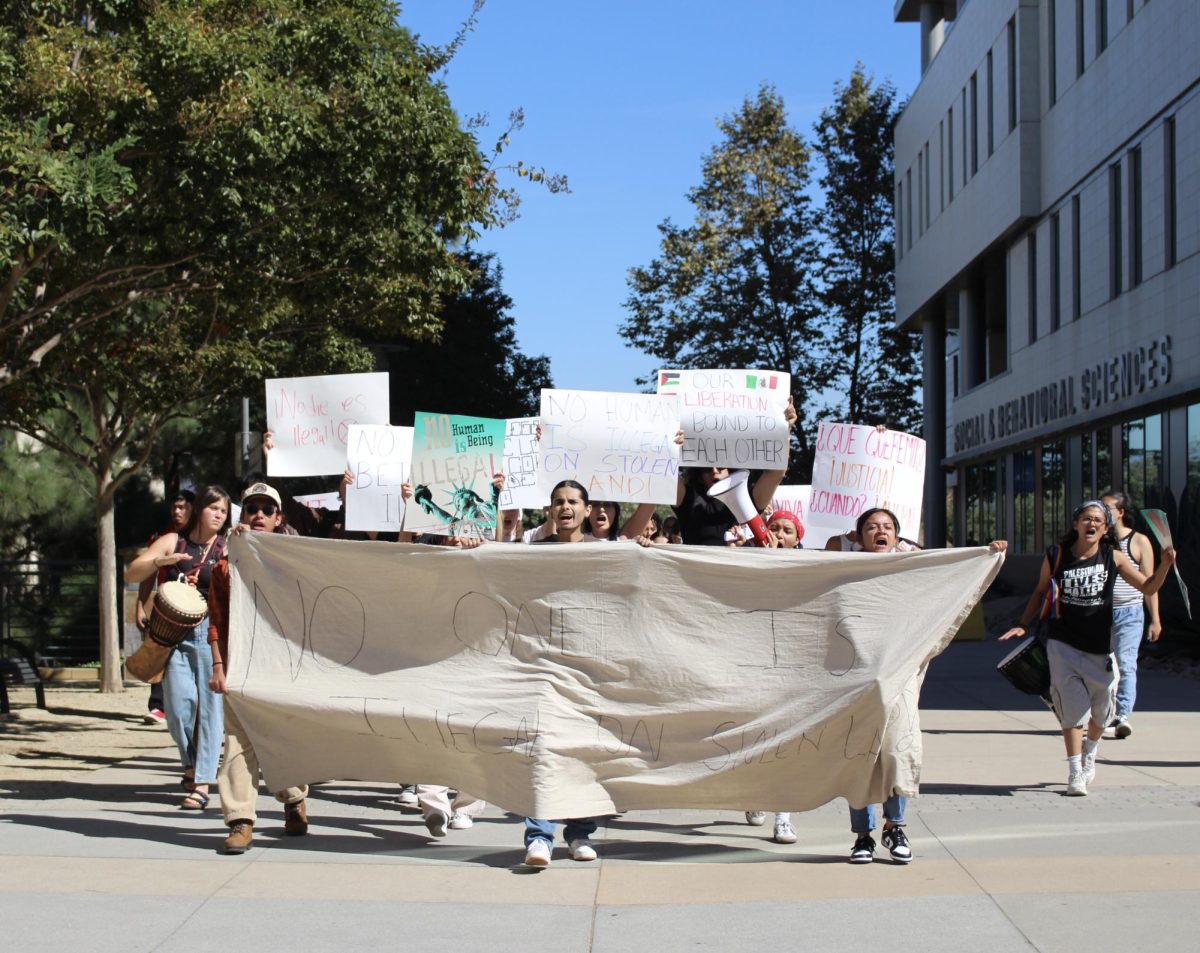A ‘No Human is Illegal’ protest, led by the Movimiento Estudiantil Chicano de Aztlán (MEChA) and the Students for Justice in Palestine (SJP), took place at Kellogg Library Circle on October 24. The protest directly addressed recent displays by the CSUSM Republicans student organization, whose signage called for deportation of “illegals”. The protest sought to denounce what MEChA and SJP described as anti-immigrant rhetoric promoted by the organization.
The protest featured chanting and a campus-wide march, with participants voicing solidarity with undocumented students and those impacted by the message. Chants included phrases such as “Say it loud, say it clear, immigrants are welcome here” and “Sin papeles, sin miedo (without papers, without fear)”.
The demonstration culminated with an open session, where students shared their personal experiences, comments and feelings about the incident.
Many participants called upon CSUSM’s Vice President for Student Affairs, Dr. Viridiana Diaz, to address and hold CSUSM Republican members accountable. In a campus-wide email sent on October 29, Dr. Diaz and Chief Diversity Officer Dr. Aswad Allen responded, emphasizing the university’s commitment to inclusivity and safety.
“We are a campus of values. In that, we oppose all forms of hate, including antisemitism, Islamophobia, anti-Indigeneity, xenophobia, sexism, homophobia, transphobia, ableism, ageism, and classism,” the statement read.
It highlighted CSUSM’s role as a “marketplace of ideas,” where free speech is respected, even when expressions may conflict with institutional values.
The message emphasized that CSUSM must uphold free speech, even when it may conflict with the institution’s values, and encouraged students to utilize support resources, including the Cougar Care Network, in response to the event.
However, the statement did not specify whether the CSUSM Republicans would face restrictions on future displays.
Jerry McCormick, CSUSM’s Director of Strategic Communications, further clarified the university’s stance.
“[CSUSM] is focused on ensuring the safety of our students, faculty, staff, and guests,” McCormick said. “CSUSM is equally committed to our inclusive educational environment and aims to minimize the disruption to our teaching and learning mission.”
Although members of the CSUSM Republicans did not attend the protest, they issued a statement explaining their actions.
“There was a tabling event [displaying the signage] with the purpose of having a political dialogue with all students about a policy [in regard to] illegal migration.” the statement read.
Their official Instagram, @csusmrepublicans,featured a video from one of their recent tabling events where the “mass deport illegals” sign was visible, accompanied by a discussion led by club president Austin Ortiz. This footage became a focal point of criticism and motivated the protest.
In an open letter, MEChA and SJP described the use of the term “illegals” as a “direct form of verbal and rhetorical dehumanization.” They argued that this language contradicts CSUSM’s values as a Hispanic Serving Institution (HSI) and endangers the emotional and physical well-being of “undocumented students, immigrants and students and/or children of immigrants.”
The DREAMer Resource Office (DRO) also participated in the event to provide information on resources for undocumented and immigrant students, including free legal assistance, counseling, and peer support groups. The DRO emphasized the importance of inclusive language and
announced two upcoming events: a healing circle (scheduled for November 7th) and a “Conversations with the Chief Diversity Officer” session.
Fina Espino, DRO’s Assistant Director, spoke on the broader impact of anti-immigrant rhetoric.
“To students, staff and anyone who is part of our CSUSM community feeling targeted or affected by these events, I want to reassure you: you are valued, you belong here, and your presence enriches our university community. We remain steadfast in our commitment to supporting you.” Espino said.
Espino encouraged affected students to connect with support networks such as FLUTTER and the upcoming Healing Circle.
When asked what steps the DRO would like to see from the administration, Espino recommended enhancing campus-wide inclusivity efforts, increasing mental health resources, and implementing policies against dehumanizing language.
“These actions would reaffirm CSUSM’s dedication to diversity and safety.” Espino added.


